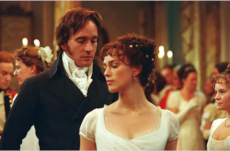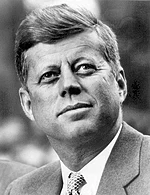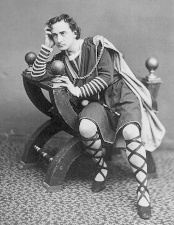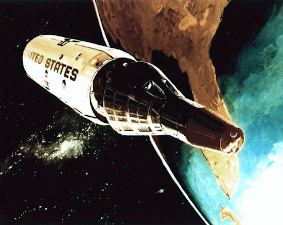Demos
Using CiteIt with different Media Types
CiteIt is developing tools that allow you to add context to your media, whether it is written word, audio, video, wikipedia, or twitter.
1. Writing
A) Expanding blockquote: #
When to Use:
Use Contextual blockquotes when:
- Larger blocks of text are desired.
- The block forms its own paragraph/s.
- Emphasis is desired through a breakout block quote.
Click on the blue arrows above and below the quote to expand the context:
Tyler Cowen interviewed Rabbi David Wolpe as part of his Conversations with Tyler Series. Rabbi Wolpe said:
I think that Judaism has the same problem that any thick civilization has in a world in which, as you say, context is stripped away. And not only is context stripped away, but attention to any one thing is scanter and less than it used to be. So, for example, a lot of Jewish commentary is based on your recognizing the reference that I make. Who recognizes references anymore? Because people don’t spend years studying books.HTML code:
I think that Judaism has the same problem that any thick civilization has in a world in which, as you say, <strong>context is stripped away</strong>. And not only is context stripped away, but attention to any one thing is scanter and less than it used to be. So, for example, a lot of Jewish commentary is based on your recognizing the reference that I make. Who recognizes references anymore? Because people don’t spend years studying books.
</blockquote>
B) Contextual Popup #
When to Use:
Use Contextual Popups when:
- The quote happens within an existing paragraph, rather than as its own paragraph.
- The quote is often (although not always) shorter in length.
- Emphasisis is not desired in the form of a breakout block.
Jane Austen’s “Pride and Prejudice” draws its title, in part from a line where the books’s main character, Elizabeth says: I could easily forgive his pride, if he had not mortified mine.
↑ Click on blue-grey quote above: ("I could easily forgive his pride ..")
HTML code:
Developer mode:
- If you inspect a page that has contextual citations in developer mode, you will see the contextual JSON files.
- In this case, the JSON file is named after the sha256 field which is: 59137b97e93432e .. .js
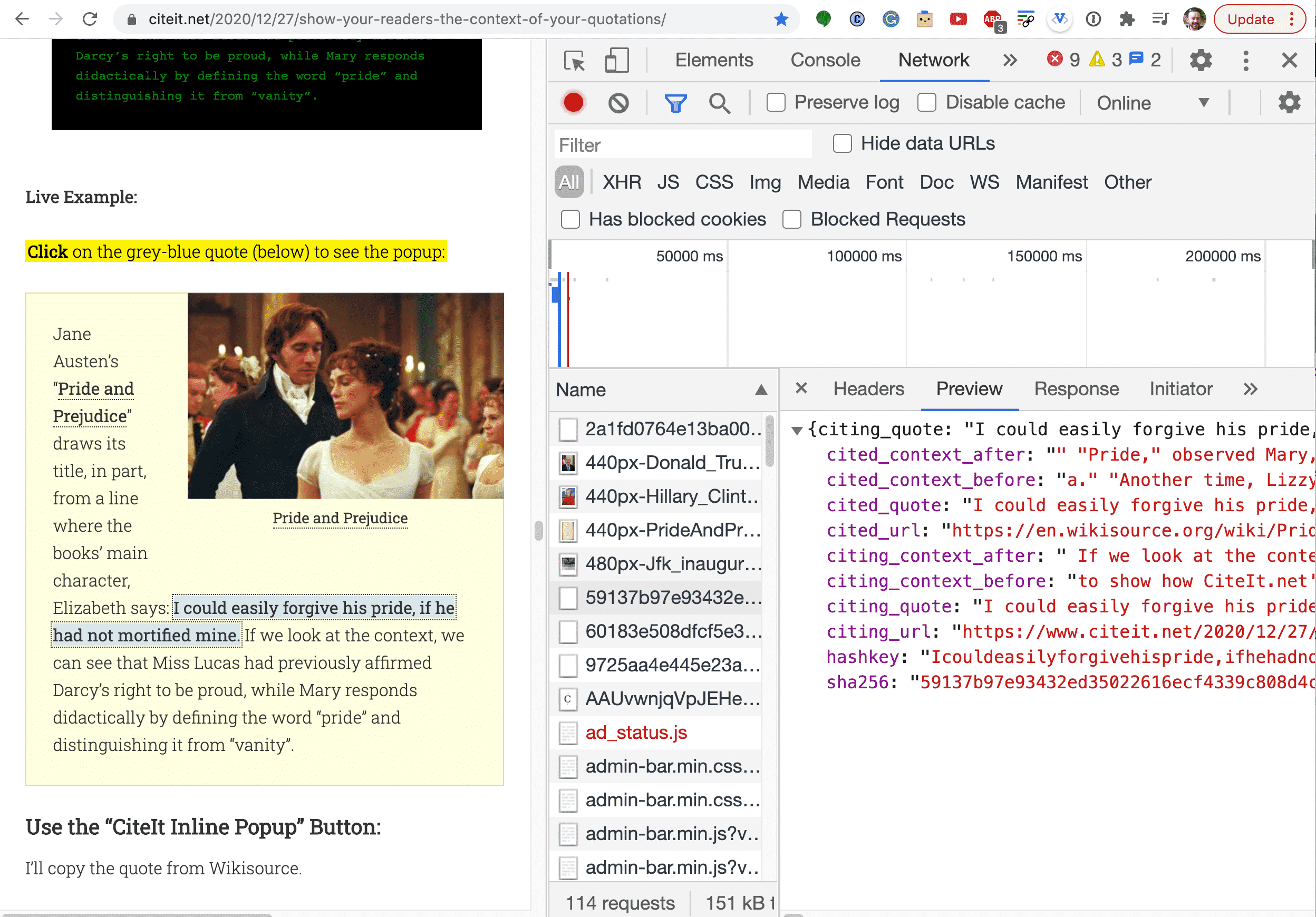 (Larger "developer mode" image)
(Larger "developer mode" image)
2. Wikipedia Citations #
Article Popups
Wikimedia already has contextual popups which appear when a reader mouses over a linked article.
Here’s a screenshot of the popup that appears on the Los Angeles Lakers article when a reader mouses over the link to the Los Angeles Sparks Basketball team.
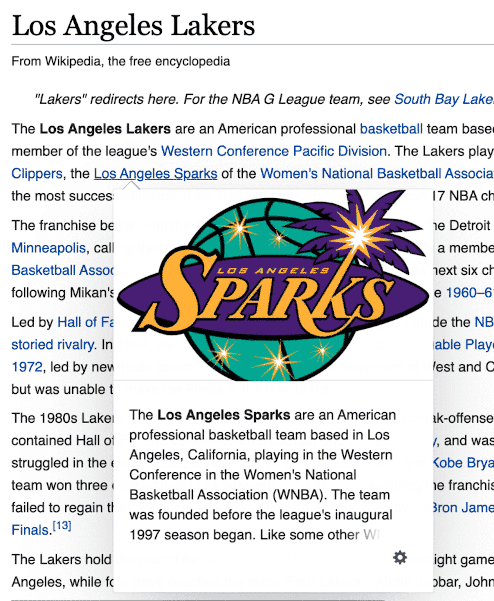
Contextual Popup
Below is a screenshot of the Ruth Bader Ginsburg article mockup which shows the CiteIt Contextual Popup that appears when a reader clicks on the light grey-blue text of a contextual quotation, in this case: “Ginsburg precedent“.
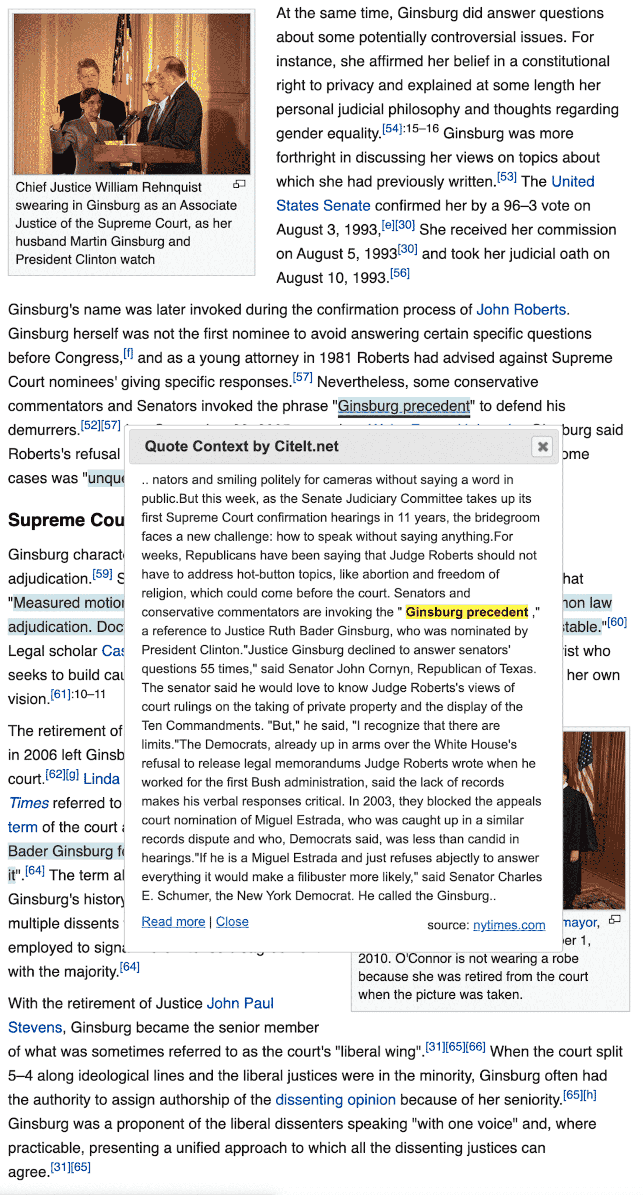
Sample Wikipedia Articles #
Example: Proposed Ruth Bader Gingsburg Wikipedia article ↓ with CiteIt Contextual PopupClick on an image below to view sample Wikipedia articles that feature contextual quotations.
3. Substack #
Mockups of what Substack articles would look like if they were using CiteIt.net:
- Adam Johnson (Citations Needed, The Column) ← Click to view example
- Ken Klippenstein (Journalist)
- Matt Taibbi Racket News ← multiple video citations
- Doomberg: Substack’s #1 Paid Finance Newsletter.
- Matthew Yglesias (Vox)
- Heather Cox Richardson, Boston College (History Professor)
- Bari Weiss The Free Press
- Mary L. Trump (Author, Psychologist, Trump's Neice)
- Charlie Sykes (The Bulwark)
4. YouTube transcripts #
Malcolm Gladwell Interview: "Westerns"
Consider how adding the video's YouTube URL to the blockquote's cite tag allows the CiteIt.net javascript library to
automatically embed the video and lookup the surrounding transcript (if a matching transcript is found).
↓ Click: "Expand: Show Video Clip" ↓
Here is a quotation from Joe Rogan's interview with Malcolm Gladwell.
- a Western is where is conceptually a world in which there is no law and order and a man shows up and imposes personally law and order on the territory the community right
- so there is also a eastern what is in Eastern and Eastern is a place where by contrast is a story where they're like I got this straight it was four types the Eastern is where there is law and order there is so there are institutions of Justice but they are have been subverted by people from within so an Eastern would be the Serpico is an Eastern it's a crooked cop who is it's the bad apple who has you know screwed up there there's lots of tons and tons of of Hollywood movies are Easterns
- the northern is the case where law and order exists and law notre is morally righteous system works law know that show law and order is a northern it's a functioning apparatus of Justice which reliably and accurately produces the right the correct result in confronting criminality every single day when it's on TV
- the southern is where the the entirely the southern is all John Grisham novels or Southern's they are where the entire apparatus is corrupt and where the reformer is not an insider but an outsider
HTML Formatting (such as bold and italics) is allowed within a citation, so long as the plain-text version matches the original quote's plain-text version.
HTML code:
<ol class="num">
<li>a <b>Western</b> is where is conceptually a world in which <b>there is no law and order</b> and a man shows up and <b>imposes personally law and order on the territory</b> the community right
<li>so there is also a <b>eastern</b> what is in Eastern and Eastern is a place where by contrast is a story where they're like I got this straight it was four types the Eastern is where there is law and order there is so <b>there are institutions of Justice</b> but they are have been <b>subverted by people from within</b> so an Eastern would be the Serpico is an Eastern it's a <b>crooked cop</b> who is it's the bad apple who has you know screwed up there there's lots of tons and tons of of Hollywood movies are Easterns</li>
<li>the <b>northern</b> is the case where law and <b>order exists and law notre is morally righteous system</b> works law know that show law and order is a northern it's a functioning apparatus of Justice which reliably and accurately produces the right the correct result in confronting criminality every single day when it's on TV</li>
<li>the <b>southern</b> is where the the entirely the southern is all <b>John Grisham novels</b> or Southern's they are where the <b>entire apparatus is corrupt</b> and where the reformer is not an insider but an <b>outsider</b></li>
</ol>
</blockquote>
View Sample article with Contextual Video Popups:
- Martin Luther King Jr.'s push for material redistribution, by Matthew Yglesiaas
5. Audio/Podcasts #
I would like to add support for audio-citations, especially for transcription of podcasts and radio.
Potential Sample Podcasts:
- The Crime Machine: Part 1 (Reply-All) ← Future Example
- The Crime Machine: Part 2 (Reply-All)
6. PDFs #
The hosted CiteIt Webservice does not current support PDFs, but this functionality is available if the application is self-hosted:
1) Children's Book: Electronic Pdf #
The webservice converts this children's book into a text-version.
>> Hammy said: we are very careful so we aren't caught.
(page 6)
2) Digital Journal Article: Electronic Pdf #
Electronically-Produced PDFs
Digitally created PDF: "Jeremey Bentham and President Roosevelt's Four Freedoms."
The webservice converts the article to a series of text-based pages, from which contextual lookups can be made.
For that very reason, the Declaration of Independence does not speak of the attainment of happiness, but of the pursuit of happiness. The question, then, is of what the ruler should do for the happiness of citizens.
3) Scanned Book: OCR Pdf #
Notice that this page contains two columns:
- War & Peace, by Leo Tolstoy
- Full Pdf 50 MB, from archive.org
- text-version
- Prince Andrew said:
I don't like your Mademoiselle Bourienne at all
.
7. Twitter & Substack Notes #
Here is an a example of what Twitter could look like if a quote were linked to its source with a contextual popup.
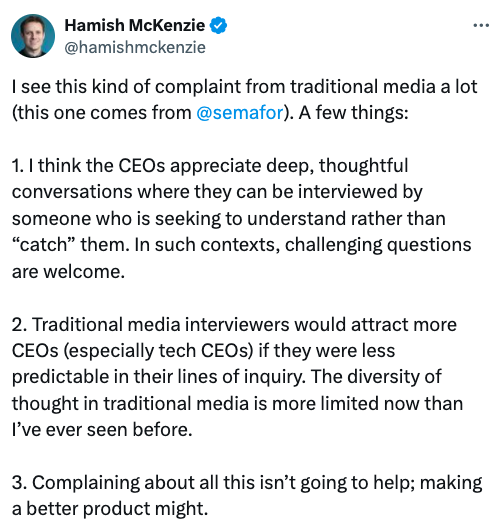
Softballs: Lex Fridman has become the tech CEO interviewer of (the CEOs’) choice,
Bloomberg reports:
Why risk putting an executive in front of an incisive journalist when there’s a gentler route?
↑ Click grey-blue text to view contextual popup ↑
Four Reasons to use Contextual Citations
- Build Trust / Dispel Cherry-picking Concerns
- Feed Curiosity / Inform of Context
- Add Color / Entertain
- Defend against Critics / Establishment Gatekeepers
View Examples
Developer Sample Code #
These examples depend upon the CiteIt javascript library being installed on the quote's webpage.
- Add CiteIt's Contextual Citations to your website. (Video tutorial)
- Advanced Examples
- Get Source Code

